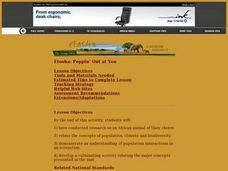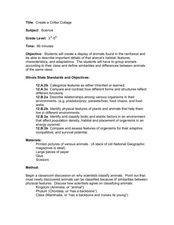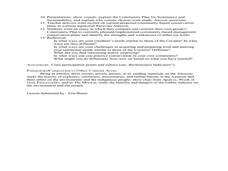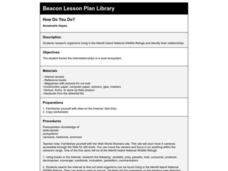Curated OER
Amazon Food Chain
Explore food chains in the Amazon Rainforest using this resource. Learners discuss the predator vs. prey relationships in the food chain. Then, they create a food web to describe this relationship. This is a simple and effective way to...
Curated OER
Costa Rican Food Chain
Discuss the animals and plants in the rainforest food chain using this lesson. Learners talk about and do research on the top predators from the Costa Rican region and create a model of one of them in class. They also make a visual model...
Curated OER
Co-evolution of Plants and Pollinators
Students explore biological evolution and natural selection and its evolutionary consequences. They also explore how organisms are interdependent on one another.
Curated OER
Etosha: Poppin' Out at You
Tenth graders research an African animal of their choice and relate the concepts of population, climate and biodiversity to their animal. They examine how population interacts in an ecosystem.
Curated OER
Create a New Animal
Students understand what physical adaptations are and how they help an animal to survive. In this adaptations lesson, students research four animals and then make an original animal that has adaptations to make them survive.
Curated OER
Create a Critter Collage
Young scholars create a collage. In this animal classification lesson, students discuss why and how scientists classify animals. Young scholars view pictures of different animals and decide which class each animal belongs to. Students...
Curated OER
The Three Worm Phyla
Ninth graders examine the three worm phyla. For this classification lesson, 9th graders observe, compare and contrast the planarian, tapeworm, and fluke.
Curated OER
Worm Interviews
Students identify types of worms. In this organisms lesson plan, students are shown slides of the different types of worms and take notes on each worm. Students answer questions about each worm.
Curated OER
Prey or Pray? Could YOU Escape a Cheetah?
Tenth graders estimate the size of an adult cheetah by research and measurement of a picture. They determine the approximate distance and speed of the cheetah from a filmed chase and compare that to their own running speed.
Curated OER
Critter Encounter Chart
Students record data found at an assigned web site. In this data collection lesson, students access an assigned web site in order to complete a data chart about animals they see. They travel to different sections of the web site to find...
Curated OER
Bird Feeding and Migration Observation
Students research bird migration and build a bird house. For this bird lesson plan, students research the birds in their area and where they migrate to. They also build their own bird house and record data on what kinds of birds come to...
Curated OER
Critters in Your Own Backyard
Students identify various animals and their habitats, as well as their specific traits In this animal habitat lesson, students list animals they've seen in their backyard. Students select one animal and do research. Students then answer...
Curated OER
Supermarkets, Sustenance and Sustainability
Students investigate jungles and the people who depend upon them. In this sustainability lesson plan, students research wild life conservation and discover the importance of a jungle to Amazonian people. Students create a group...
Curated OER
How Do You Do?
Seventh graders research organisms in the Merritt Island National Wildlife Refuge. They create a picture book demonstrating their understanding of relationships.
Curated OER
Household Pests
Sixth graders discover the various habitat requirements for assorted household pests from ants to wasps. They conduct various activities including researching the life cycles moths, cockroaches, and mosquitoes
















